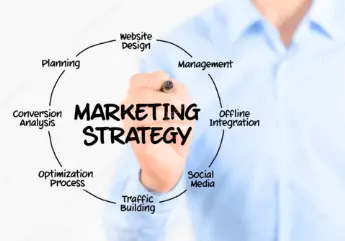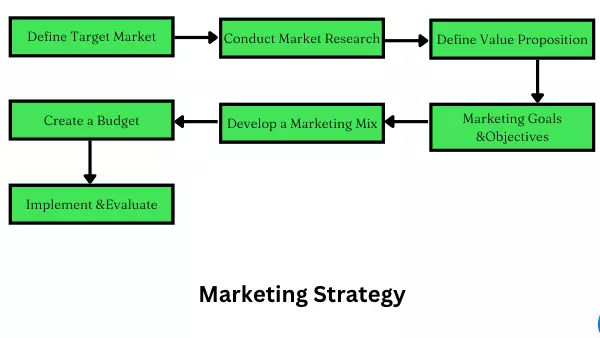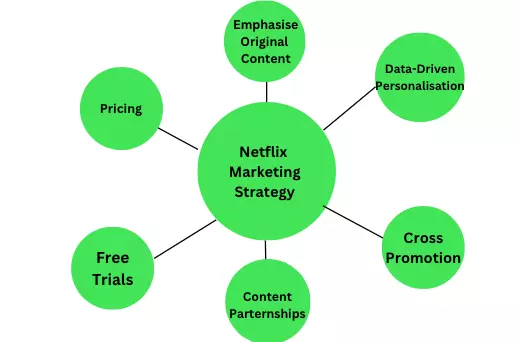Marketing Strategy
Definition
A marketing strategy refers to a company’s overall plan for promoting and selling its products or services by understanding customer’s needs.
Description
Marketing strategy helps companies promote and sell their products or services by identifying target markets, defining unique value propositions, and developing tactics to engage potential customers.

It involves identifying target markets, understanding customer needs and preferences, defining the company’s unique value proposition, and developing tactics to reach and engage potential customers.
A marketing strategy may include advertising, public relations, sales promotions, and other tactics to build brand awareness, generate leads, and drive sales. In addition, a marketing strategy aims to create a sustainable competitive advantage for the company in its chosen market.
Importance of Marketing Strategy
Marketing strategy is essential because it helps companies to:
- Identify and understand their target markets, which allows them to tailor their products and services to meet customer needs and preferences.
- Develop a unique value proposition that sets the brand apart from competitors and creates a competitive advantage that can drive sales and profitability over the long term.
How to make a Marketing Strategy?
Developing a marketing strategy typically involves the following steps:

- Define your target market: Identify your ideal customer and determine their needs, wants, and preferences.
- Conduct market research: Gather information about your target market, competitors, industry trends, and other relevant factors that may impact your business.
- Define your unique value proposition: Determine what sets your product or service apart from others in the market and articulate it clearly.
- Set marketing goals and objectives: Define specific, measurable goals that align with your business objectives.
- Develop a marketing mix: Determine which tactics (e.g. advertising, public relations, social media, etc.) you will use to reach your target market and achieve your marketing goals.
- Create a budget: Allocate resources (e.g. time, money, staff) to support your marketing activities.
- Implement and evaluate: Execute your marketing plan and monitor its performance, making necessary adjustments to meet your goals and objectives.
Types of Marketing Strategies
There are several types of marketing strategies that companies can use, including:
- Digital marketing: Leveraging online channels such as social media, email, and search engines to promote products or services.
- Content marketing: Creating and distributing valuable, relevant content to attract and retain a target audience.
- Relationship marketing focuses on building long-term customer relationships by providing exceptional customer service and personalised experiences.
- Influencer marketing: Collaborating with social media influencers to promote products or services to their followers.
- Guerrilla marketing: Using unconventional tactics, such as stunts or flash mobs, to create buzz and generate attention for a brand.
- Product differentiation: Emphasising unique features or benefits of a product or service to distinguish it from competitors.
- Price differentiation: Offering different pricing options or discounts to appeal to customer segments.
- Segmentation and targeting: Identifying specific customer groups and tailoring marketing messages to their needs and preferences.
- Branding: Creating a distinct brand identity through visual and messaging elements to build recognition and loyalty.
Future Aspect of Marketing Strategy for Online Marketing
The future of marketing strategy for online marketing is likely to involve several key trends:
- Personalization: As technology advances, marketers can create more personalised customer experiences, using data to deliver tailored content, recommendations, and offers.
- AI and automation: Artificial intelligence and automation will increasingly streamline marketing processes, improve targeting, and provide more efficient customer service.
- Voice search optimization: With the growing popularity of voice-activated assistants like Siri and Alexa, marketers must optimise their content for voice search queries.
- Interactive content: Interactive content such as quizzes, polls, and augmented reality experiences will become more common, offering engaging and immersive ways to promote products and services.
- Video marketing: Video content will continue to be a powerful marketing tool, with live video, 360-degree video, and virtual reality experiences becoming more prevalent.
- Omnichannel marketing: As customers interact with brands across multiple channels, marketers must create seamless experiences integrating online and offline touchpoints.
Read More : All About Content Creation, Curation & Distribution For a Winning Marketing Strategy
Example:
Netflix’s marketing strategy is focused on creating a strong brand identity and delivering personalised content to its target audience. Some critical elements of its strategy include:

- Emphasising original content: Netflix has invested heavily in producing original movies and TV shows, which helps to differentiate its offering and build customer loyalty. Stranger Things, Virgin River, The Crown, etc are some of the examples which have stolen the viewers mind and helped Netflix earn their large share in the market.
- Data-driven personalization: Using data and algorithms to suggest content based on a customer’s viewing history and preferences helps keep them engaged and reduces churn. The predictions by Netflix shows 80% accurate suggestions in what the users might be interested in.
- Cross-promotion: Promoting new releases to customers through email, social media, and in-app notifications, which helps to drive viewership and boost engagement.
- Content partnerships: Partnering with studios and other content providers to licence popular movies and TV shows helps fill gaps in its content library and attract new customers.
- Free trials and pricing: Offering free trials and flexible pricing options to attract new customers and retain existing ones.
FAQs
What is a marketing strategy?
A marketing strategy is a plan that outlines how a company will promote and sell its products or services to target customers. It involves identifying target markets, developing unique value propositions, and creating tactics to engage potential customers.
Why is marketing strategy necessary?
Marketing strategy is essential because it helps companies to identify and understand their target markets, develop a unique value proposition, and create a competitive advantage that can drive sales and profitability over the long term.
What are the steps involved in making a marketing strategy?
The steps in making a marketing strategy include defining your target market, conducting market research, defining your unique value proposition, setting marketing goals and objectives, developing a marketing mix, creating a budget, and implementing and evaluating your plan.
What are the different types of marketing strategies?
There are several marketing strategies, including digital marketing, content marketing, relationship marketing, influencer marketing, guerrilla marketing, product differentiation, price differentiation, segmentation and targeting, and branding.
What are the future aspects of marketing strategy for online marketing?
The future of marketing strategy for online marketing is likely to involve personalization, AI and automation, voice search optimization, interactive content, video marketing, and omnichannel marketing.
What is the marketing strategy of Netflix?
The marketing strategy of Netflix is centred on delivering a personalised and convenient viewing experience to its target audience while investing in original content to differentiate itself from competitors. Key elements of its strategy include emphasising original content, data-driven personalization, cross-promotion, content partnerships, and flexible pricing options.





We would love to have your opinion.